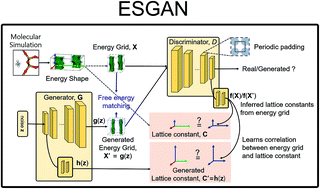Predicting performance limits of methane gas storage in zeolites with an artificial neural network†
Abstract
Performance limit is an important metric that can determine the commercial feasibility of a given class of materials. Here, an artificial neural network is used to generate crystalline nanoporous materials (i.e. shapes) in the energy space, and molecular simulations are conducted directly on a large number of these generated shapes to obtain the performance limits. A test application of methane storage in zeolites reveals excellent agreement in the methane working capacity values of top performing structures between the real zeolites and the shapes generated from our neural network. Moreover, even when the real zeolites with the highest working capacity values are excluded from the input training sets, our neural network generates shapes that yield large working capacity values that are close to the true maximum value. With further development, this method can be extended to other applications and materials, thereby providing rational guidance to construct reasonable performance targets for future development of materials.

- This article is part of the themed collection: Editor’s Choice: Machine Learning for Materials Innovation


 Please wait while we load your content...
Please wait while we load your content...